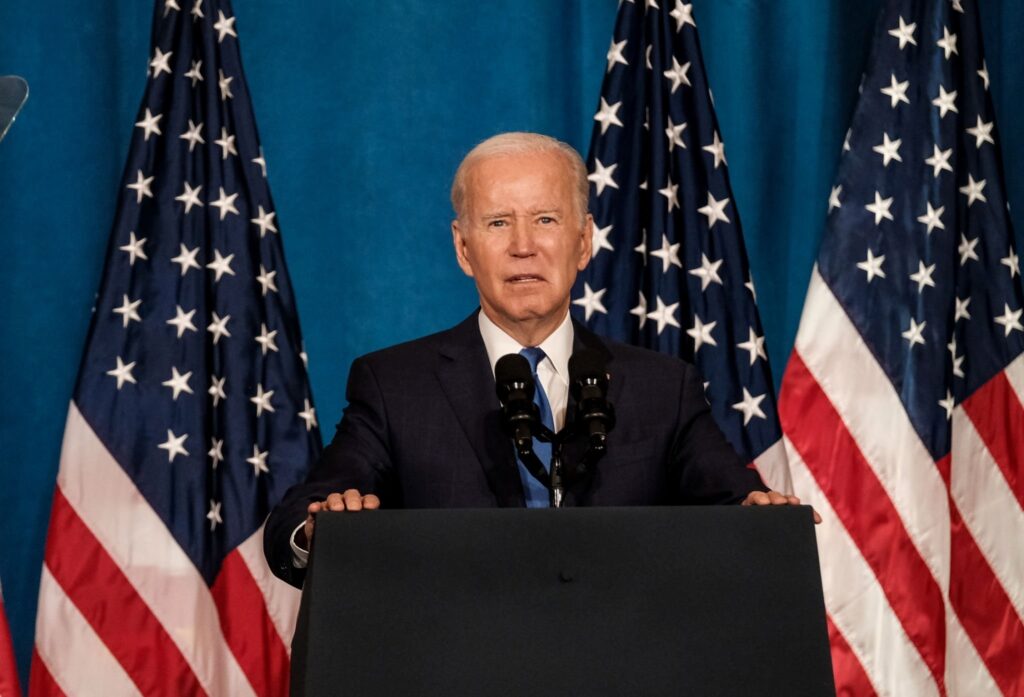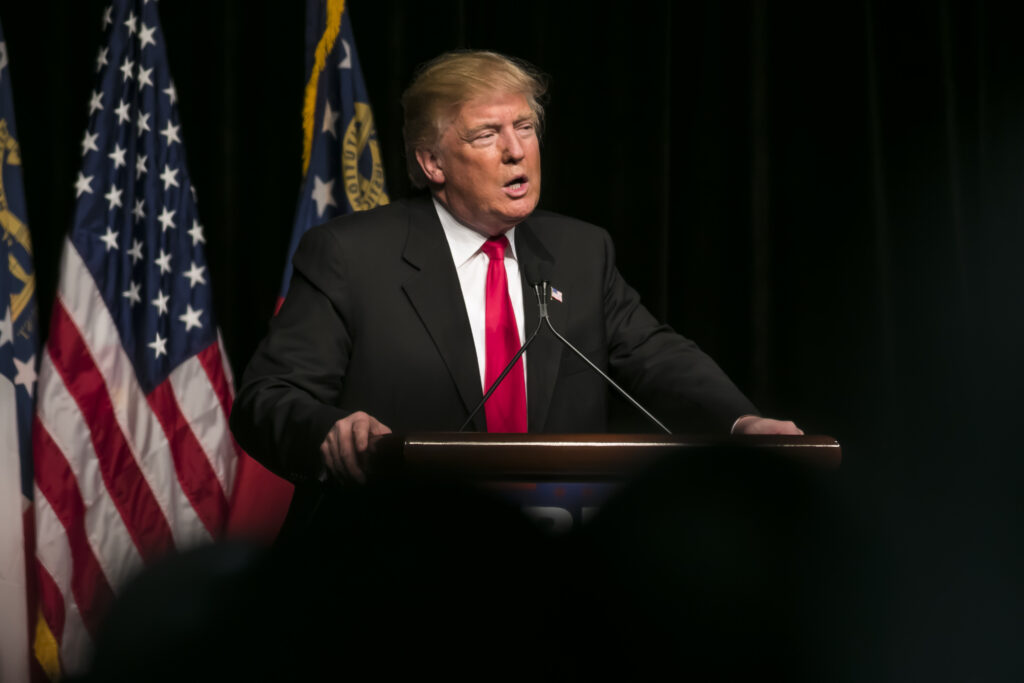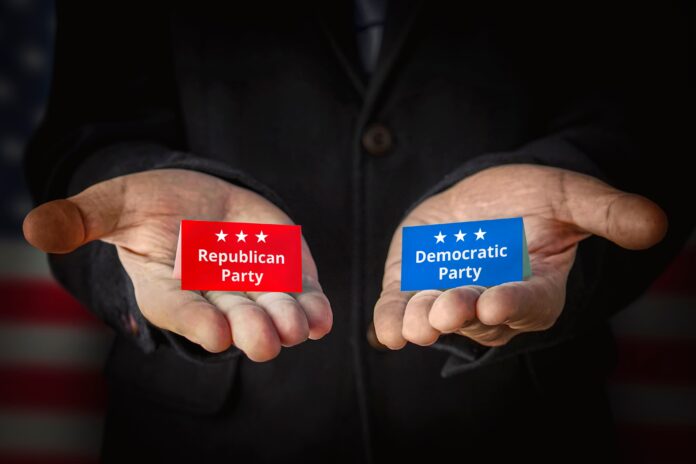Red states grew redder and blue states bluer during the contentious lawmaking season
In an era of heightened polarization, America’s state capitals are witnessing an unprecedented level of ideological divide. Lawmakers are unyieldingly pushing either conservative or liberal agendas, even in traditionally politically diverse regions. This has resulted in red states growing even redder, and blue states becoming bluer in the contentious lawmaking season, as the state capitals mirror the intensified partisan landscape.
The 2022 election granted single-party control of the governor’s office and legislature to an astounding 39 states, marking the highest number in at least three decades.
A wave of conservative-driven momentum swept through a substantial number of 22 Republican-led states. They pushed for a range of restrictive policies. These included new regulations on abortion, sweeping limitations on gender transitions for minors, and laws constraining discussions about sexuality within school classrooms.
In contrast, Democratic-controlled states, wielding full control in 17 regions, countered with their own legislative agenda. They enacted new gun control measures, established restrictions on carbon emissions, and established safe spaces that safeguarded abortion rights and provided comprehensive medical care for transgender individuals.
The conclusion of the contentious lawmaking season nationwide revealed an increasingly pronounced division between Republican and Democratic states, particularly regarding highly contentious social issues. Republican-led states forged ahead with initiatives that solidified their conservative stance, simultaneously targeting the authority of Democratic officeholders and seeking to curtail the autonomy of liberal-leaning cities.
The consequences of this ideological polarization were palpable, prompting Tim Storey, the CEO of the National Conference of State Legislatures, a nonpartisan organization, to remark, “We’ve always known that California was progressive, Texas was conservative, but it now feels like almost every state is kind of falling into one of those categories.”
Consequences of Partisan Shifts in Florida and Minnesota
In Florida, a state that had previously supported Barack Obama in two presidential elections but has since shifted its allegiance toward Republicans, Governor Ron DeSantis enacted a series of laws that imposed restrictions on abortion, banned transgender medical care for minors, relaxed the criteria for imposing the death penalty, and allowed the carrying of concealed guns without a permit.
Similarly, in Minnesota, where Democrats recently gained control of a legislative chamber, Governor Tim Walz signed a set of bills that solidified abortion rights, legalized recreational marijuana, and expanded voting rights for felons. This string of progressive victories caught the attention of former President Obama, who took to Twitter to remind everyone about the consequences of elections, stating, “If you need a reminder that elections have consequences, check out what’s happening in Minnesota.”
Minnesota Republicans were well aware of the situation. Within a short span of time, they observed their state transform into a testing ground for progressive policies, despite the fact that a significant number of Minnesotans vote for the Republican party.
Mark Johnson, the Republican leader in the Minnesota Senate, expressed his concern, stating, “The real travesty is, that’s nearly 50% of the state that we represent. And so it’s constituents across the state that had little or no voice.”
Tony McCombie, the House leader of the Republican minority in Illinois, a state where Democrats have maintained single-party control for five consecutive years, cautioned against majority parties veering too far in a particular direction, emphasizing the potential for long-term political jeopardy.
McCombie asserted, “States that do this on the right or the left — it’s going to blow up. The pendulum will swing the other way.”
Iowa Republicans Solidify Conservative Dominance in the Contentious Lawmaking Season

In Iowa, Republicans, capitalizing on their trifecta of power—control of the governorship and both legislative chambers—have persistently advanced their agenda, further solidifying the state’s transition from a swing state to a stronghold of conservatism.
Governor Kim Reynolds, in alignment with her fellow Republicans, recently enacted significant legislation, including the relaxation of child labor regulations and the authorization of taxpayer funds for private school tuition. Additionally, Iowa joined the ranks of at least 16 states this year that imposed bans or significant restrictions on gender transition treatments for minors.
Governor Reynolds, acknowledging the state’s growing reputation, proudly declared, “Americans are taking notice as states around the country are looking to Iowa as a beacon for freedom and opportunity.” She hailed the recently concluded legislative session as “historic” in a statement issued last month.
In one of the final acts of the legislative session, Governor Reynolds approved several bills, including one that curtails the powers of the state auditor, sparking strong objections from Democrats. The measure limits the state auditor’s ability to access personal information and pursue legal action against state agencies during investigations. Democrats expressed adamant opposition to the bill, particularly since the state auditor, Rob Sand, is the sole remaining Iowa Democrat holding statewide office.
Sand criticized the legislation as a partisan overreach that could hinder his effectiveness in fulfilling his responsibilities. He further highlighted a broader trend, both in Iowa and across the nation, where the voice of the minority party appears to be disregarded, suggesting that the current system is no longer functional. Despite these concerns, a spokesperson for the governor declined to comment when approached for an interview.
Republican Power Plays and Policy Battles: A State-by-State Analysis
Republicans flexed their political muscle in several states by implementing measures that curtailed or diminished the influence of elected Democrats. In a glaring example, Mississippi’s Republicans established a state-controlled police force and a separate court system confined to the boundaries of Jackson, the predominantly Black and Democratic capital city.
Meanwhile, Texas Republicans pushed through a bill that aimed to increase state supervision over elections in the county encompassing Houston. In Tennessee, two Democratic legislators were expelled by Republicans after protesting on the House floor. Additionally, a Democratic lawmaker in Montana faced exclusion from the House floor for voicing opposition to a bill that restricted transgender rights.
The rulings of the U.S. Supreme Court in the previous year heightened the sense of urgency and often fueled contentiousness during the contentious lawmaking season.
Following the court’s affirmation of the right of Americans to carry guns beyond their residences, Democrats introduced new legislation this year with the aim of imposing restrictions on firearm accessibility. At the same time, proponents of gun rights initiated lawsuits to challenge these restrictions, while Republicans enacted laws to broaden access to firearms.
Concerning abortion, an issue that the court devolved to the states, Republicans took measures to significantly limit or prohibit access in multiple states such as Florida, Nebraska, North Carolina, North Dakota, South Carolina, and Wyoming, despite internal party disagreements regarding the extent of these restrictions. On the other hand, Democrats endeavored to fortify abortion protections in many of their states.
The year began with Democrats assuming full control in four newly acquired states—Maryland and Massachusetts, where the governorship shifted, and Michigan and Minnesota, where legislative control changed hands. This marked a significant increase in the number of states under Democratic control, surpassing any point since 2009.
After an extended period of Republican dominance at the state level, during which they enacted sweeping legislation, Democrats viewed this session as an opportunity to reverse recent trends. Presently, slightly more Americans reside in states governed by Democrats than in those where Republicans hold power.
Melissa Hortman, the speaker of the Minnesota House, expressed her lifelong aspiration to be part of such a moment. She referred to this year’s session as a golden opportunity, characterized by a favorable combination of a Democratic trifecta, a surplus, and well-prepared bills and authors.
In Michigan, where Democrats secured full control for the first time since the 1980s, lawmakers made significant progress in a single session day. They introduced bills to establish LGBTQ rights, implement a red-flag gun law, and repeal a contentious right-to-work law that had drawn opposition from labor unions.
Winnie Brinks, the majority leader in the Michigan Senate, acknowledged that Democrats had a clear vision for their policies and acted swiftly. However, she also acknowledged that the approach taken may not have fostered the best working relationships with Republicans.
Partisan Clashes and Electoral Prospects in the Contentious Lawmaking Season

Throughout the country, certain issues resonated across party lines, such as economic development and mental health. Many states had the opportunity to allocate funds from federal pandemic relief programs, as the economy remained relatively stable. These funds allowed for the creation of new programs, tax cuts, or direct payments to residents. Notably, California faced a significant budget deficit in the tens of billions of dollars, making it an exception to this trend.
In Oregon, Senate Republicans impeded the legislative process by leaving the Capitol, denying Democrats the quorum needed to pass their agenda. In Missouri and Nebraska, Democratic filibusters consumed valuable legislative time and secured limited concessions from Republicans regarding bills pertaining to transgender rights.
Disagreements also arose within the Democratic Party. In New York, some legislative Democrats deemed a judicial nominee proposed by the Democratic governor to be too conservative.
In Texas, Republicans had differing opinions on whether to impeach the state’s Republican attorney general.
Colorado, a former swing state where Democratic power has steadily grown in recent years, witnessed lawmakers raising the minimum age for purchasing guns, mandating gender-neutral bathrooms in new public buildings, and passing a pioneering law that made it easier for farmers to repair their own equipment. However, Democrats disagreed on a measure that would have prohibited certain high-powered guns, resulting in the failure of that bill.
Julie McCluskie, the Democratic speaker of the Colorado House of Representatives, emphasized that Democrats do not always vote in alignment with the party’s directives.
The legislative season this year was highly polarized, and the next one has the potential to be even more imbalanced. While most states will not hold statewide elections until 2024, a few races in November provide Republicans an opportunity to secure up to three additional trifectas. Democrats face the challenge of defending governorships in Kentucky and Louisiana, traditionally Republican-leaning states in presidential elections.


